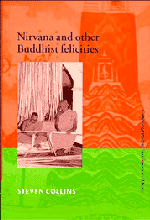Book contents
- Frontmatter
- Contents
- Preface and acknowledgments
- List of abbreviations
- Textual chronology
- General introduction: Buddhism and civilizational history 1 – structures and processes
- PART 1 NIRVANA IN AND OUT OF TIME
- Introduction to part 1: systematic and narrative thought - eternity and closure in structure and story
- 1 The concept of nirvana
- 2 The imagery of nirvana
- 3 Nirvana, time and narrative
- Conclusion to part 1: modes of thought, modes of tradition
- PART 2 PARADISE IN HEAVEN AND ON EARTH
- Appendices (translated texts)
- Bibliography
- Glossary and index of Pali and Sanskrit words
- Name index
- Subject index
2 - The imagery of nirvana
Published online by Cambridge University Press: 18 December 2009
- Frontmatter
- Contents
- Preface and acknowledgments
- List of abbreviations
- Textual chronology
- General introduction: Buddhism and civilizational history 1 – structures and processes
- PART 1 NIRVANA IN AND OUT OF TIME
- Introduction to part 1: systematic and narrative thought - eternity and closure in structure and story
- 1 The concept of nirvana
- 2 The imagery of nirvana
- 3 Nirvana, time and narrative
- Conclusion to part 1: modes of thought, modes of tradition
- PART 2 PARADISE IN HEAVEN AND ON EARTH
- Appendices (translated texts)
- Bibliography
- Glossary and index of Pali and Sanskrit words
- Name index
- Subject index
Summary
WORDS FOR NIRVANA
The words (pari-)nirvāna and (pari-)nibbāna
Sanskrit nirvāna is nibbāna in Pali, just as parvata, mountain, is pabbata. (For the change n–n see below.) Modern historical philology derives nirvāna from the verbal root vā, to blow, with the prefix nis (changed to nir before v), the most common sense of which is negative or privative. From the earliest Sanskrit texts nir-vā has been used intransitively: to go out, be extinguished. Causative (and so transitive) forms of the verb are common: to make go out, extinguish. The English “blow out” and “quench” are useful translations in both cases, since they can be intransitive or transitive. Nirvāna in Sanskrit can be a past participle or adjective meaning “blown out,” but it is more commonly used in both Sanskrit and Pali as a noun, referring to the event or process of blowing out, quenching, and also to the resultant state. When the term is used as a soteriological metaphor in Buddhism the standard image is not of wind or some other agent actively putting out a fire, but of a fire's going out through lack of fuel:
Just as an oil-lamp burns because of oil and wick, but when the oil and wick are exhausted, and no others are supplied, it goes out through lack of fuel (anāhāro nibbāyati), so the [enlightened] monk … knows that after the break-up of his body, when further life is exhausted, all feelings which are rejoiced in here will become cool.
- Type
- Chapter
- Information
- Nirvana and Other Buddhist Felicities , pp. 191 - 233Publisher: Cambridge University PressPrint publication year: 1998



